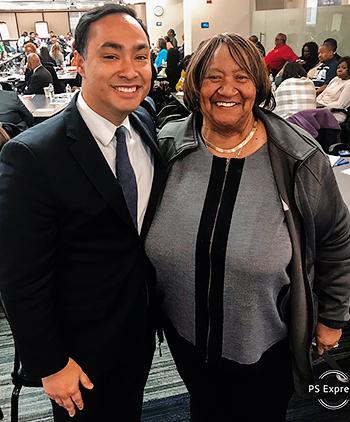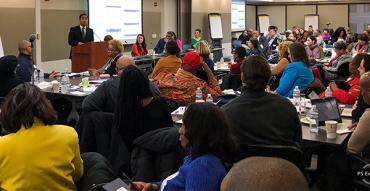The “blue wave” of the recent midterm elections may have given progressive activists a lift, but for many, including AFT leaders, the work is just beginning. Rolling up their sleeves with a range of powerful diversity partners, the AFT Civil and Human Rights Committee hosted a workshop to strategize the best way forward in what promises to be a challenging election in 2020.
From the detailed graphs analyzing voter participation and priorities during the midterm elections, to frames for inspiring and reaching the electorate moving forward, meeting participants shared specific goals and lessons learned. The point? “To think about what worked and what didn’t work, and how we all come together,” said AFT President Randi Weingarten. “How do we actually listen to each other and make allies with each other in a meaningful way so that together we can fight what is impossible to fight alone?”
During a series of panel discussions, leaders from the Alliance to Reclaim Our Schools, the Asian Pacific American Labor Alliance, the NAACP, People for the American Way, Voto Latino, United We Dream and others tackled election analysis, strategy and legislative agendas.
Some of the takeaways:
- Voter turnout during 2018 was way up, and people of color made a big difference in the outcomes.
- The majority of voters responded most to messages about healthcare and the economy, and less to those urging them to stand up to President Trump.
- Inspiring candidates played a big role in turning out the vote—there were so many Latinas running, Voto Latino declared it “The Year of the Latina”—but issues are the more lasting tool to motivate voters to get to the polls.
- Ballot initiatives, including redistricting, ethics reform and voter registration laws, help bring out the vote.
- Even when candidates lose, the engagement they create within their communities is a win moving forward.
- Door knocking and phone banking are important tools, especially when reaching out to people who have been ignored in previous elections.
- Voter protection is crucial.
- Diversifying the candidate pool further, with candidate training, is an effective way to involve more voters.
Special guest Rep. Joaquin Castro (D-Texas) described the urgency of making sure that “every single person has access to the infrastructure of opportunity,” from public schools to healthcare and a living wage. He noted the “amazing victories” in 2018 and the new Congress that “will change people’s lives,” but also noted the importance of pushing hard to get out the vote in 2020. “We can’t just rely on individual campaigns to do that work,” he said. “They go after the people who have already availed themselves of the political process. But what that means is that so many African-Americans and Latinos and others are not getting the door knocks, the phone calls, the literature that’s mailed to the house. So they feel like nobody’s talking to them.”
To that end, participants identified an urgent need for voter participation campaigns that are linguistically, aesthetically and culturally appropriate for voters. From messaging to media platforms, consultants, pollsters and the rest of the election infrastructure must reflect and be rooted in communities of color. And the mission must go beyond candidates, as Castro suggested—participants agreed that building communities of voters, with infrastructure and lasting support, is essential and must be funded apart from candidates’ campaign money.
Asked to frame their priorities for the next election, the group came up with a long list, including dismantling current immigration policy, reinvesting in public schools and services, tackling student debt, building up community schools, protecting voters’ rights and addressing affordable housing, gun safety legislation, reproductive justice and criminal justice reform. With progressive candidates in the mix and momentum from 2018, there is real opportunity to make some change—as Weingarten said, “Elections do have consequences.”
“It is critical that we activate for 2020,” said AFT Secretary-Treasurer Lorretta Johnson, urging organizers to “take our message to the streets to the people who feel left out of the process.” While she recognized the “tremendous momentum” from 2018, she said that “as we look ahead to the 2020 elections, we have to challenge ourselves to do more.”
[Virginia Myers]


